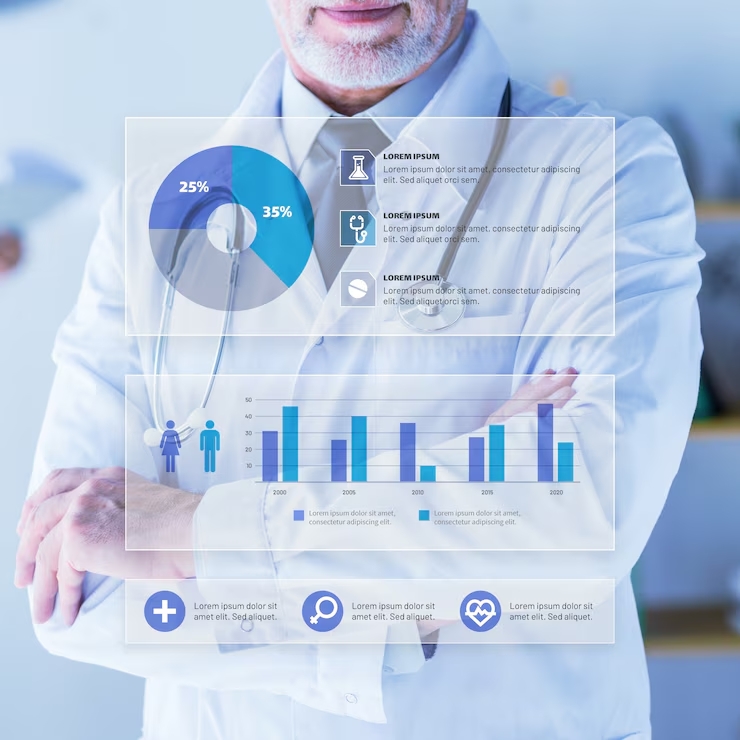In the modern age, where data reigns supreme, data analytics in healthcare has emerged as a game-changer. It is transforming how medical professionals diagnose, treat, and prevent diseases, while also improving operational efficiencies in healthcare systems. This blog explores how data analytics is revolutionizing healthcare, its key applications, and the challenges it faces.
What is Data Analytics in Healthcare?
Data analytics in healthcare involves the systematic collection, processing, and analysis of healthcare data to derive actionable insights. This encompasses clinical data, patient records, and operational statistics, enabling better decision-making for healthcare providers.
With advances in technology, data analytics can now leverage big data, machine learning, and artificial intelligence to uncover patterns and trends that were previously invisible. From improving patient outcomes to streamlining hospital operations, data analytics is proving to be an indispensable tool.
Applications of Data Analytics in Healthcare
1. Predictive Analytics for Disease Prevention
One of the most promising uses of data analytics in healthcare is predictive analytics. By analyzing historical and real-time data, healthcare providers can identify at-risk patients and intervene before diseases progress. For example:
- Predicting diabetes risk based on genetic factors and lifestyle data.
- Identifying potential heart disease cases using wearable devices that monitor blood pressure and heart rate.
This proactive approach not only saves lives but also reduces the burden on healthcare systems.
2. Enhanced Diagnostics and Treatment Plans
Accurate diagnosis is the cornerstone of effective treatment. With the help of data analytics, medical professionals can:
- Identify patterns in symptoms and test results.
- Use AI-powered imaging tools for accurate detection of diseases like cancer.
For example, radiology departments now use data analytics to enhance imaging accuracy, reducing the chances of misdiagnosis and enabling personalized treatment plans.
3. Operational Efficiency in Hospitals
Hospitals face challenges in resource allocation, staff scheduling, and managing patient flows. Data analytics in healthcare enables hospitals to:
- Predict peak admission times and plan staffing accordingly.
- Optimize supply chains for medical equipment and medications.
- Reduce patient wait times through better scheduling algorithms.
These improvements not only enhance patient satisfaction but also lower operational costs.
4. Patient Engagement and Experience
With wearable health devices and mobile apps, patients now generate vast amounts of health-related data. Analytics tools can process this data to:
- Offer personalized health recommendations.
- Enable remote patient monitoring, reducing the need for frequent hospital visits.
- Provide insights into patient behavior to improve care delivery.
For example, apps that track blood sugar levels for diabetes patients help doctors monitor their condition and make adjustments in real-time.
5. Population Health Management
On a larger scale, data analytics in healthcare is instrumental in understanding and addressing public health challenges. By analyzing population-level data, governments and healthcare organizations can:
- Track disease outbreaks and predict their spread.
- Evaluate the effectiveness of public health interventions.
- Allocate resources to underserved regions more efficiently.
Challenges in Implementing Data Analytics in Healthcare
While the benefits of data analytics are undeniable, several challenges must be addressed to realize its full potential:
1. Data Privacy and Security
Healthcare data is sensitive, and ensuring its privacy is paramount. Breaches can lead to severe consequences for both patients and organizations. Implementing robust encryption and adhering to regulations like HIPAA are critical.
2. Data Integration
Healthcare systems often use disparate technologies that store data in silos. Integrating this data into a unified system is challenging but necessary for effective analysis.
3. Skills Gap
The adoption of data analytics in healthcare requires skilled professionals who understand both data science and healthcare systems. Bridging this skills gap is vital for its successful implementation.
4. Cost of Implementation
Deploying advanced analytics tools can be expensive, particularly for smaller healthcare providers. However, as technology becomes more accessible, these costs are expected to decrease over time.
The Future of Data Analytics in Healthcare
As technology advances, the role of data analytics in healthcare will only grow. Key trends shaping its future include:
- Artificial Intelligence (AI): AI will enhance the capabilities of data analytics, making predictions and recommendations even more accurate.
- Real-Time Analytics: With the proliferation of IoT devices and wearables, real-time data analysis will become more prevalent, enabling instant decision-making.
- Patient-Centered Analytics: Future systems will focus more on individual patient experiences, ensuring personalized and efficient care.
Conclusion
The integration of data analytics in healthcare is transforming the industry, improving patient outcomes, reducing costs, and enhancing operational efficiencies. From predictive analytics to personalized treatment plans, the possibilities are endless. However, overcoming challenges like data privacy, integration, and cost is essential to unlock its full potential.
As healthcare continues to evolve, embracing data analytics is not just an option but a necessity. By leveraging the power of data, we can create a future where healthcare is smarter, more efficient, and more patient-focused than ever before.





Comments